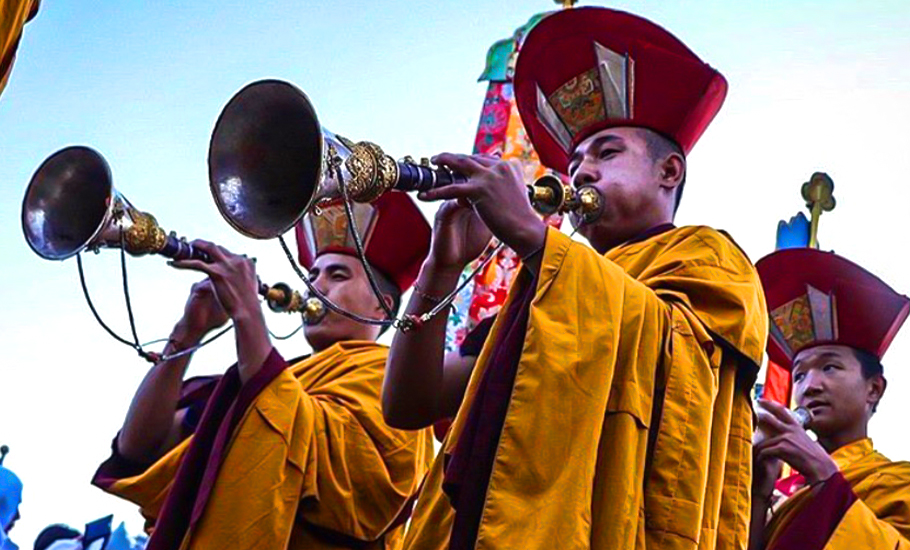
New definition of ‘Sikkimese’ in I-T Act sparks fears of Kashmir-like fate
Protesters feel tinkering with the term ‘Sikkimese’ would lead to the dilution of special provisions

Will the special provisions granted to Sikkim under the Constitution go the Kashmir way?
This concern has been raised after the Union Finance Ministry recently amended the Income Tax Act 1961 to redefine the term “Sikkimese”, putting the tranquil hilly state on the boil.
To allay fears, the Sikkim government convened a one-day special session of the Assembly on Monday (April 10). It sought a clarification from the Centre on the expansion of the definition.
Opposition parties, as well as civil society organisations, feel that tinkering with the term “Sikkimese” would lead to the dilution of the special provisions granted to the Himalayan state under Article 371F of the Constitution.
Also read: Violence breaks out in Sikkim amid SDF’s bandh over immigrant row
The constitutional safeguard bars non-Sikkimese people from buying land in the tiny border state and getting state government jobs. It also exempts the indigenous Sikkimese from paying income tax. Similar privileges enjoyed by Kashmiris under Article 370 were scrapped in August 2019.
Who are the Sikkimese?
Apart from native Bhutias and the Lepchas, Nepalis who had been settled in the erstwhile kingdom of Sikkim prior to its merger with India on April 26, 1975, are considered indigenous Sikkimese people under the provisions of the Article 371F that sanctified the Sikkim Subjects Regulation, 1961.
The latest amendment in the Income Tax Act by the Finance Act 2023 expanded the definition to include the people of Indian origin who were residing in the kingdom prior to the merger though they were not considered Sikkim Subjects under the 1961 regulation.
The amendment to the Section 10(26AAA) of the Income Tax Act has been made to include the old-Indian settlers and their descendants in the definition of Sikkimese following a Supreme Court order that had termed the exclusion “unconstitutional”.
The apex court was hearing a writ petition wherein the petitioner had argued that Indian settlers could not enjoy the I-T exemptions granted to the state’s indigenous population because of the exclusion.
Also read: SC verdict on Sikkimese Nepalis: 2-day bandh in Sikkim; minister quits
Indian settlers were not included in the Register of Sikkim Subjects unlike their Nepalese counterparts because the ruler of Sikkim had imposed a condition that Sikkim Subjects should not hold citizenship of any other country, said Nirmalya Banerjee, who delved into the issue in his book The Buddha and the Borders.
“Indian settlers did not surrender their Indian citizenship whereas the Nepalese gave up the citizenship of their country of origin to get the Sikkim Subject status,” Banerjee explained.
There are about 500 families of pre-merger settlers of Indian origin who are likely to get tax exemptions due to the new definition of “Sikkimese”. They are from different ethnic groups, such as Marwaris, Punjabis, and Biharis.
Protests over new definition
The extension of the benefit has triggered massive protests, leading to even political clashes — something the peaceful state had never witnessed in the past.
Keshav Sapkota, the general secretary of the Joint Action Council (JAC), an apolitical umbrella body of civil-society organisations, was attacked at Singtam in Gangtok district. The JAC is spearheading the campaign against the amendment.
Mechung Bhutia, a former MLA and member of the state’s main opposition party, the Sikkim Democratic Front (SDF), was also attacked in Singtam on the same day.
Also read: Protests in Sikkim as SC refers to Sikkimese Nepalis as people of ‘foreign origin’
SDF president and former chief minister Pawan Kumar Chamling, expressing concern over the recent incidents, claimed that the state has become a hotbed of political violence.
Former Indian football captain Bhaichung Bhutia, who now heads Hamro Sikkim Party, staged a demonstration at Singtam police station, protesting against the new culture of violence in the state.
On February 4, there were clashes between the ruling Sikkim Krantikari Morcha (SKM) and SDF cadres at Namchi. Stones were pelted at the SDF’s party office after they called for a Sikkim bandh on February 4 and 5.
Need to separate I-T exemption from Article 371F
Chief Minister and president of the ruling SKM, Prem Singh Tamang (Golay), blamed Opposition parties and those protesting against the Centre’s decision for the current situation in the state.
He said they were creating unnecessary controversy by linking the I-T exemption with Article 371F. In a recent Facebook post, he stated that Union Finance Minister Nirmala Sitharaman had assured him that the amendment was only related to income tax exemption, and the original definition of “Sikkimese” will always be respected.
But failing to convince protesters and the Opposition, his government convened the special session of the Assembly.
Also read: Sikkim to plant 100 trees for every child born in state
After the session, the chief minister told media persons that he had suggested to the Speaker to form an all-party delegation to meet representatives of the Centre to seek clarification on the expansion of the definition of “Sikkimese”.
Earlier, the Assembly decided to request the Centre to maintain exclusivity of the term “Sikkimese” and to place the groups newly added to the definition in the “Others” category, thus segregating them from the three ethnic communities.
It further decided to request the government of India to “acknowledge and maintain that the special status and distinct identity/classification granted to the Sikkimese people are the political commitments and assurances given to the people of Sikkim at the time of the merger and the definition of ‘Sikkimese’ shall not be diluted and the sentiments of the people of Sikkim will not be hurt.”

